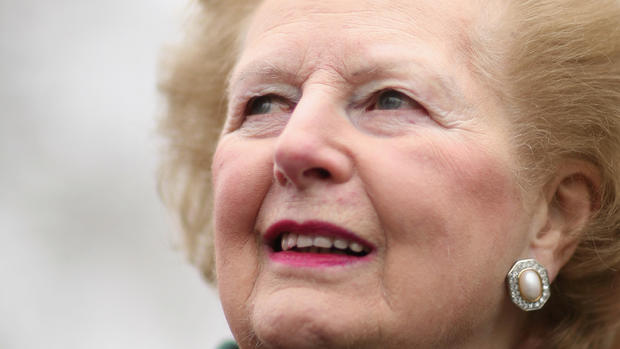The lady vanishes: Decoding the Thatcher legacy
Commentary:
(MoneyWatch) The news of Margaret Thatcher's death came through as I was meeting with a female British lawyer. She was quite moved, recalling her delight when Thatcher became prime minister. At last: The world was going to see just what women could do!
- Former U.K. prime minister Margaret Thatcher dies at 87
- Newly-released Thatcher documents shed light on relationship with Reagan
The world did see -- and some loved it while others loathed it. No one in living memory in British politics has so polarized public opinion. That she was a leader seemed obvious; that she was "female" in her leadership style and policies was more questionable. Certainly anyone who had expected a gentler, more empathetic form of conservatism was thoroughly disappointed. Thatcher's brand of leadership was old-school command-and-control. You were for her or against her. Consensus wasn't an issue with Thatcher; she knew what she wanted to do and no one would stand in her way.
Many of the Conservative grandees had hoped that, having elected her, they could manage her, little imagining that her gender didn't betoken weakness, conciliation or collaboration. Like many women since, Thatcher clearly felt that the only way not to be belittled by men was to be so much stronger, more determined and more disciplined than any of her male peers. She had staunch allies, such as Keith Joseph and William Whitelaw, and fair weather allies such as Geoffrey Howe and Michael Heseltine, along with a vast number of followers who supported her as long as she delivered elections. The minute she lost that capacity, the many enemies she had made came out of the woodwork to dispose of her.
Thatcher did what many leaders do when they are the first in their group to attain a position of command: She borrowed from an earlier, traditional leadership manual. You can see this any time a leadership position is first occupied by a woman, someone from an ethnic or religious minority, or from a group with a different sexual orientation. Their difference is pronounced, obvious -- and it's enough. Now they must reassure those around them that everything else is not new, not different. In other words, they have to work hard to fit into established conventions in order that their difference not set the agenda. Having won leadership as a women, Thatcher spent the rest of her time at the top being "more masculine" than the men around her. Similarly, in the U.S. the first African-American president has worked hard to fit into a highly conventional leadership style. One difference is enough.
In Thatcher's case, this meant that many women who had supported her lost their enthusiasm; my lawyer friend certainly did. But it leaves an interesting legacy. The next female prime minister won't be the first. Her difference won't be such an issue. And that will liberate her to be different. Whether this is a legacy Thatcher would have welcomed we will never know. In this, as in many things, she won't have the last word.
